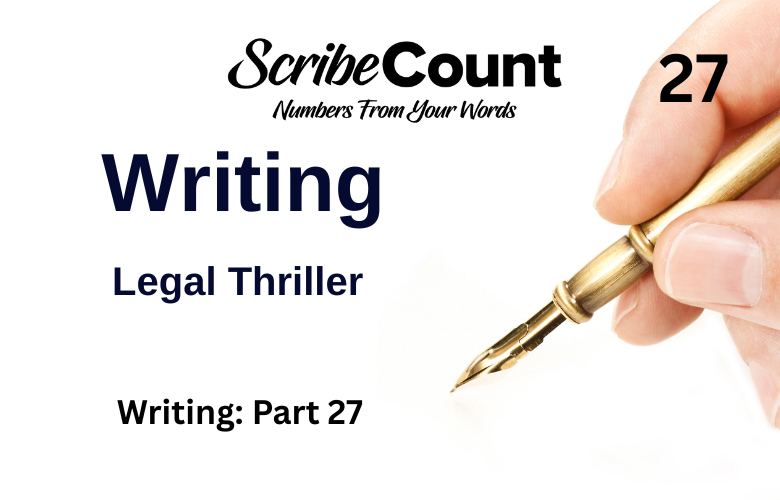Legal Thriller for Indie Authors: How to Write a Suspenseful Courtroom Drama
Legal thrillers are a compelling genre that combines the intellectual challenge of legal battles with the high-stakes tension of a suspenseful thriller. These novels often feature a protagonist—typically a lawyer—who must navigate complex legal challenges, ethical dilemmas, and often dangerous situations while trying to solve a case or uncover a conspiracy. Legal thrillers captivate readers by blending intricate plotlines, courtroom drama, and personal stakes, making them a popular genre for readers who love suspense, legal intrigue, and moral questions.
For indie authors, writing a legal thriller provides a unique opportunity to combine the excitement of a thriller with the intellectual rigor of the law. Whether your protagonist is a defense attorney fighting to save a wrongly accused client, a prosecutor trying to convict a criminal mastermind, or an investigator uncovering a deep conspiracy, legal thrillers offer the chance to explore themes of justice, morality, and the fine line between right and wrong. This guide will help you navigate the key elements of writing a legal thriller, from developing compelling characters to crafting a plot filled with suspense and tension.
What Makes a Legal Thriller Novel?
A legal thriller is a type of novel in which the central conflict revolves around the law, legal procedures, or a courtroom drama. At its core, the genre is about the battle for justice—whether it’s a lawyer defending a client, a prosecutor working to convict a criminal, or an investigator uncovering hidden truths. What makes a legal thriller unique is its ability to combine suspense with intellectual and procedural complexity.
One of the defining characteristics of a legal thriller is the courtroom drama. While the courtroom doesn’t have to be the sole setting for the story, it is often the place where much of the conflict takes place. The tension between lawyers, witnesses, jurors, and the judge creates a charged environment where every word, gesture, and argument matters. Legal thrillers often involve dramatic cross-examinations, surprise evidence, and the emotional weight of high-stakes cases, making the courtroom a thrilling arena for conflict.
Another important element is the investigation. Legal thrillers often include a deep dive into the case—whether it’s uncovering evidence, interviewing witnesses, or unearthing hidden facts. This investigative aspect is usually tied to a larger mystery or conspiracy, with the protagonist working to uncover the truth while facing obstacles, corruption, or threats.
The protagonist in a legal thriller is often a lawyer or a legal professional, but they may also be an investigator, journalist, or someone who becomes embroiled in the legal process. The protagonist’s role is to navigate the complex legal world, solve the case, and seek justice, often dealing with moral dilemmas, ethical challenges, or personal stakes along the way. The protagonist should be intelligent, resourceful, and capable of thinking critically under pressure.
Conflict is at the heart of a legal thriller. The central conflict typically revolves around a legal case—whether it's the prosecution of a criminal, the defense of an innocent person, or the unraveling of a conspiracy. The protagonist often faces a powerful adversary, whether it’s a ruthless opponent in the courtroom, a corrupt system, or personal enemies seeking to undermine the protagonist’s pursuit of justice. The legal conflict is often combined with personal stakes, such as the protagonist’s career, reputation, or safety, adding layers of tension and urgency.
The Popularity of Legal Thriller Fiction
Legal thrillers have been a staple of popular fiction for decades, with authors like John Grisham, Scott Turow, and Michael Connelly shaping the genre. Grisham’s The Firm (available on Amazon) and Turow’s Presumed Innocent (available on Apple Books) are prime examples of how legal thrillers can combine suspense, courtroom drama, and complex characters to create gripping narratives that keep readers on the edge of their seats. These novels, along with countless others, have proven that legal thrillers have a broad and loyal audience.
For indie authors, legal thrillers provide a rich genre to explore, especially as readers continue to seek out compelling stories that explore the justice system, ethical dilemmas, and the pursuit of truth. The genre’s wide appeal makes it an excellent option for indie writers who want to craft a story filled with intrigue, suspense, and intellectual challenge. Moreover, legal thrillers are versatile, often incorporating elements of mystery, drama, and even romance, allowing authors to play with different styles and tones.
Reader Expectations for Legal Thriller Fiction
When readers pick up a legal thriller, they expect a story that combines intellectual stimulation with high-stakes suspense. One of the most important elements is believable legal procedures. Readers want to understand how the legal system works, whether it’s a trial, an investigation, or a courtroom showdown. While some liberties can be taken, the legal aspects of the story should feel grounded in reality, with accurate depictions of legal terms, procedures, and strategies.
Readers also expect complex characters, particularly the protagonist, who must navigate the intricacies of the case while dealing with personal stakes. Whether the hero is a seasoned lawyer, a rookie investigator, or someone caught in a moral dilemma, readers want characters they can root for and understand. The antagonist, whether it’s a corrupt lawyer, a powerful criminal, or a morally ambiguous character, must be equally compelling.
Another expectation is suspense and twists. Legal thrillers are often filled with dramatic moments—surprise revelations, unexpected witnesses, and courtroom confrontations—that keep the reader hooked. Suspense builds not only through the legal process but also through the stakes of the case. The tension in a legal thriller often lies in the balance between what is known and what is yet to be discovered.
Finally, readers expect a satisfying resolution. The case should be resolved in a way that makes sense within the story’s context. Whether the resolution involves the conviction of a criminal, the exoneration of an innocent person, or a morally complex outcome, the ending should provide closure to the legal conflict while tying up any emotional or personal storylines.
Common Tropes in Legal Thriller Novels
Legal thrillers often share certain elements that readers have come to expect, but the best authors know how to play with these tropes to create fresh and engaging stories. Some of the most common tropes in legal thriller fiction include:
- The Morally Complicated Lawyer: The protagonist is often a lawyer who must grapple with ethical dilemmas and personal conflicts while trying to win a case. Whether they are defending a guilty client or prosecuting a criminal they secretly sympathize with, the lawyer’s moral compass is often tested.
- The Wrongfully Accused: A central theme in many legal thrillers is the case of someone who has been wrongly accused of a crime. The protagonist must work to uncover the truth and clear the accused person’s name, often against powerful forces that want to suppress the truth.
- The Clever Villain: Many legal thrillers feature a villain who is as intelligent and resourceful as the protagonist. This creates a battle of wits, with the protagonist and antagonist constantly trying to outsmart each other in court.
- The Courtroom Showdown: The courtroom is often the setting for the final confrontation between the protagonist and the antagonist. The tension and drama of the courtroom are essential to many legal thrillers, with dramatic cross-examinations, surprise evidence, and high-stakes testimony.
- The Hidden Evidence: Legal thrillers often feature hidden or suppressed evidence that must be uncovered by the protagonist. This evidence is typically key to solving the case and bringing the criminal to justice.
- The Corporate or Government Conspiracy: In many legal thrillers, the protagonist uncovers a large conspiracy involving powerful institutions, such as a corporation, the government, or the legal system itself.
Structuring Your Legal Thriller Novel: The Plot Map
Here’s a simple plot map you can follow when planning your legal thriller novel, ensuring the legal aspects, character development, and suspense work together in a compelling way:
- Normal World: Introduce your protagonist in their everyday life, whether it’s in a courtroom, law office, or on a case. This is where you establish the character’s motivations, values, and professional skills.
- Inciting Incident: Something happens that sets the plot in motion—a client is accused of a crime, a case is presented, or a new piece of evidence comes to light. The protagonist becomes involved in a legal battle.
- Rising Action: The protagonist investigates, builds their case, and faces challenges. They encounter obstacles from the opposition, uncover hidden truths, and deal with personal dilemmas. This is where the tension builds.
- Climax: The case reaches a boiling point, often involving a courtroom showdown or a revelation that changes the course of the case. The protagonist and antagonist have their final confrontation.
- Resolution: The case is resolved, and the protagonist deals with the emotional and professional consequences of the outcome. The resolution should provide closure to both the legal conflict and the character arcs.
Final Thoughts for Indie Legal Thriller Writers
Writing a legal thriller offers the chance to combine intellectual challenges with suspenseful storytelling. The genre is perfect for exploring themes of justice, morality, and the law, while keeping readers on the edge of their seats with twists, turns, and high-stakes drama. As an indie author, you have the opportunity to craft intricate plots, develop compelling characters, and create a narrative that is both engaging and thought-provoking.
By mastering the balance between legal accuracy, suspense, and character development, you can write a legal thriller that keeps readers hooked from the first page to the last. Whether you focus on courtroom drama, investigative suspense, or complex ethical dilemmas, your legal thriller can captivate readers and make them think about the law and justice in a new light.

